The relation between executive functions and math intelligence in preschool children

Inhibition, mental set shifting, and memory updating are related to math skills in preschool children.
These meta-analytic findings from a research project led by the Luxembourg Center for Educational Testing and the University of Oslo were published in the Psychological Bulletin.
Would you follow the squirrel?
Imagine you're sitting in your first-grade math class while there is an orange squirrel jumping from branch to branch just outside the classroom window. Will you watch the little animal doing its breakneck acrobatics or would you stay focus on your subtraction task? Most children would probably follow the squirrel.
Those who had the urge to watch it but nevertheless stayed on the math task, have just experienced inhibition. Inhibition is the ability to deliberately override a dominant or automatic response when needed. When you think back to your school years, this is needed, for instance, in learning math whenever the correct answer to the question is not obvious, and the task requires thorough thinking.
Inhibition is also important to remain focused and persistent, and to avoid distractions. Besides inhibition, mental set shifting comes in handy, when you need to switch between different math tasks. For example, such as between adding and subtracting. Further, updating of the working memory (aka short time memory) is key to manipulate information we have just learned. It is the capacity to hold the results of a math task in our memory to do further calculations with it. Inhibition, mental set shifting and memory updating are three psychological mechanisms called executive functions.
Executive functions and math skills
These three executive functions—inhibition, shifting, and updating—are linked to achievement in school subjects, specifically in math. Students who perform low on tests of executive functions tend to perform worse in math tests as well.
Because math skills predict not only school success but also success later in life (such as job success, see e.g., The predictive validity of cognitive ability tests: A U.K. meta-analysis), it is interesting to know how exactly executive functions and math skills are associated, preferably before children enter schools.
Synthesizing 363 research results from 30,481 preschool children
In a project from the of the Faculty of Humanities, Education and Social Sciences University of Luxembourg with the University of Oslo, Valentin Emslander focused on preschool children. The earlier in life we invest in children, the greater the positive change we can promote. The team reviewed more than 4,000 scientific articles on the topic and finally compiled 363 results from 30,481 preschool children from around the world.
Combining prior study results is frequently done in political or educational decision-making to find developmental trends and to increase the accuracy and certainty in our findings corroborated by a large number of children. The combined findings showed that children who can inhibit being distracted, shift easily between different tasks, and update the information they have just learned score high on math tests. The researchers also found evidence that inhibition, shifting, and updating are equally important for math skills.
Finally, they discovered that the executive functions–math link depends on how exactly these skills were measured. Their findings can help create interventions for children struggling with math learning and stimulate new research questions. Willing to go further, the team is now investigating how the link between executive functions and math skills changes with age.
The paper was recently published in Psychological Bulletin.
Emslander says, "I am incredibly happy to help shine a light on this fascinating area of research. It is important we investigate children's math learning processes as they are key for children's further success not only in school but also in life at large. The earlier we invest in children, the greater are the benefits from it. That is one of the reasons our findings are so important for research and practice."
More information: Valentin Emslander et al, The relation between executive functions and math intelligence in preschool children: A systematic review and meta-analysis, Psychological Bulletin (2022). DOI: 10.1037/bul0000369
Journal information: Psychological Bulletin
Provided by University of Luxembourg





















